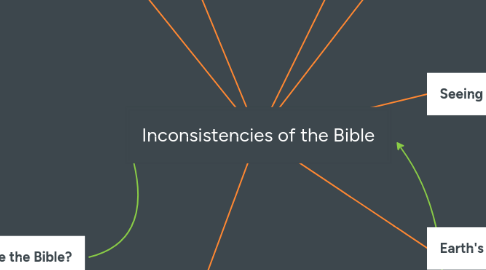
1. Adam and Eve/ How did we come from only two people?
1.1. Incest
1.1.1. “And if a man shall take his sister, his father’s daughter, or his mother’s daughter…it is a wicked thing….” — Leviticus 20:17
1.1.1.1. Now this is one that I not only find interesting but also find it as one of the most important ones as this would also first go back to the beginning when it was Adam and Eve in the Garden of Eden. Since God, according to Leviticus 20:17, states that a man taking his sister is a wicked thing then how comes he not only accepted and blessed Sara, Abraham´s wife AND sister but even gave her a son. This would help support that either God is simply just superstition to convince one to avoid doing so or that the Bible is indeed flawed
1.1.2. [But what was god’s reaction to Abraham, who married his sister — his father’s daughter?] “And God said unto Abraham, As for Sara thy wife…I bless her, and give thee a son also of her…” — Genesis 17:15-16
2. God's "Perfection"
2.1. “As for God, his way is perfect: The Lord’s word is flawless; he shields all who take refuge in him.”
2.2. When God created his Angels they were designed to be obedient to him in every way. However Lucifer rebelled against God and even convinced other Angels to rebel as well. Lucifer is also referred to as Satan, one of 7 fallen Angels
3. Temptation
3.1. “Let no man say when he is tempted, I am tempted of God: for God cannot be tempted with evil, neither tempteth he any man.” — James 1:13
3.1.1. This shows that there are conflicts upon whether or not God could and would tempt man as Genesis 22:1 states that ¨God did tempt Abraham" which goes against James 1:13 saying simply that man cannot be tempted of God or by God
3.2. “And it came to pass after these things, that God did tempt Abraham…” — Genesis 22:1
4. The Power of God
4.1. “… with God all things are possible.” — Matthew 19:26
4.1.1. This specific inconsistency is linked with ¨Gods Perfection"as God is said to be perfect in all he does. so if the quote ¨... with God all things are possible" was true, which is already being debated by Judges 1:19, then God would indeed be able to drive out the inhabitants of the valley however as said above this is conflicting with Judges 1:19 (see below quote)
4.2. “…The LORD was with Judah; and he drove out the inhabitants of the mountain; but could not drive out the inhabitants of the valley, because they had chariots of iron.” — Judges 1:19
5. Seeing God
5.1. “… I have seen God face to face, and my life is preserved.” — Genesis 32:30
5.1.1. Simply another contradiction not much weight or backstory behind this.
5.1.2. This is yet another contradiction that other than showing some of the faults and inconsistencies in the bible doesn't hold too great a weight.
5.2. “No man hath seen God at any time…”– John 1:18
6. Earth's Permanence
6.1. “… the earth abideth for ever.” — Ecclesiastes 1:4
6.2. “… the elements shall melt with fervent heat, the earth also and the works that are therein shall be burned up.” — 2 Peter 3:10
7. Who wrote the Bible?
7.1. 5 Books all written at different times and different people.
7.1.1. Centuries apart- Warped Story?
7.1.1.1. Christians also state that the Bible was all written by Moses in 1,300 B.C.
7.1.2. Genesis, Exodus, Leviticus, Numbers, and Deuteronomy
7.2. The "E" Authors known as Elohist, this name was given to them as they refer to God as "Elohim". Elohim is also apparently plural and so chapter one of the bible really states "Gods created the Heavens and Earth" The E authors are believed to have written a part of Exodus, and Numbers. It is also believed that they are the ones who wrote the Bible's creation account in Genesis chapter one. Believed to have been written by the 900's B.C.
7.2.1. "P" or "Priestly" refers to a whole school of writers live in the late sixth century B.C. right after the Babylonian captivity meaning that these writers effectively had to reinvent their people's religion from fragmented texts. They wrote a few verses of Genesis and Exodus however they virtually wrote the entirety of Leviticus and Numbers
7.3. Multiple authors
7.3.1. "J" Authors are thought to be the second author(s) of the first five books, much of Exodus and Genesis including the creation account in Genesis chapter two specifically where Adam is created before the serpent. The name comes from "Jahwe" which is the German translation of "YHWH" or better known "Yahweh" both being God's true name which is also what the J author(s) refer to God as. 600 B.C. is when this was thought to be written
7.3.1.1. "D" stand for "Deuteronomist" which quite simply means "guy who wrote Deuteronomy". D was first attributed to Moses but this isn't possible unless he wrote in the third person often, could see the future and also write in a language that hadn't even existed yet. This part of the Bible was supposedly found around 640 B.C. just to show the gaps in time of when each part of the Bible was written.
8. Is Christianity flawed or just superstition?
8.1. Question
9. Works Cited:
9.1. Bible Gateway
9.1.1. This was used to find quotes taken directly from the Bible
9.2. American Atheists
9.2.1. Biblical Contradictions- This is an adaptation of an article originally written by former Interim President and current member of the Board of Directors Frank Zindler. [No new author was named nor publish date stated]
9.2.1.1. Also used to find contradictions and inconsistencies
9.3. October 20th, 2018 By Bob Seidensticker ¨Top 20 Most Damning Biblical Contradictions¨
9.3.1. used to find examples of quotes along with brief explanations of each
